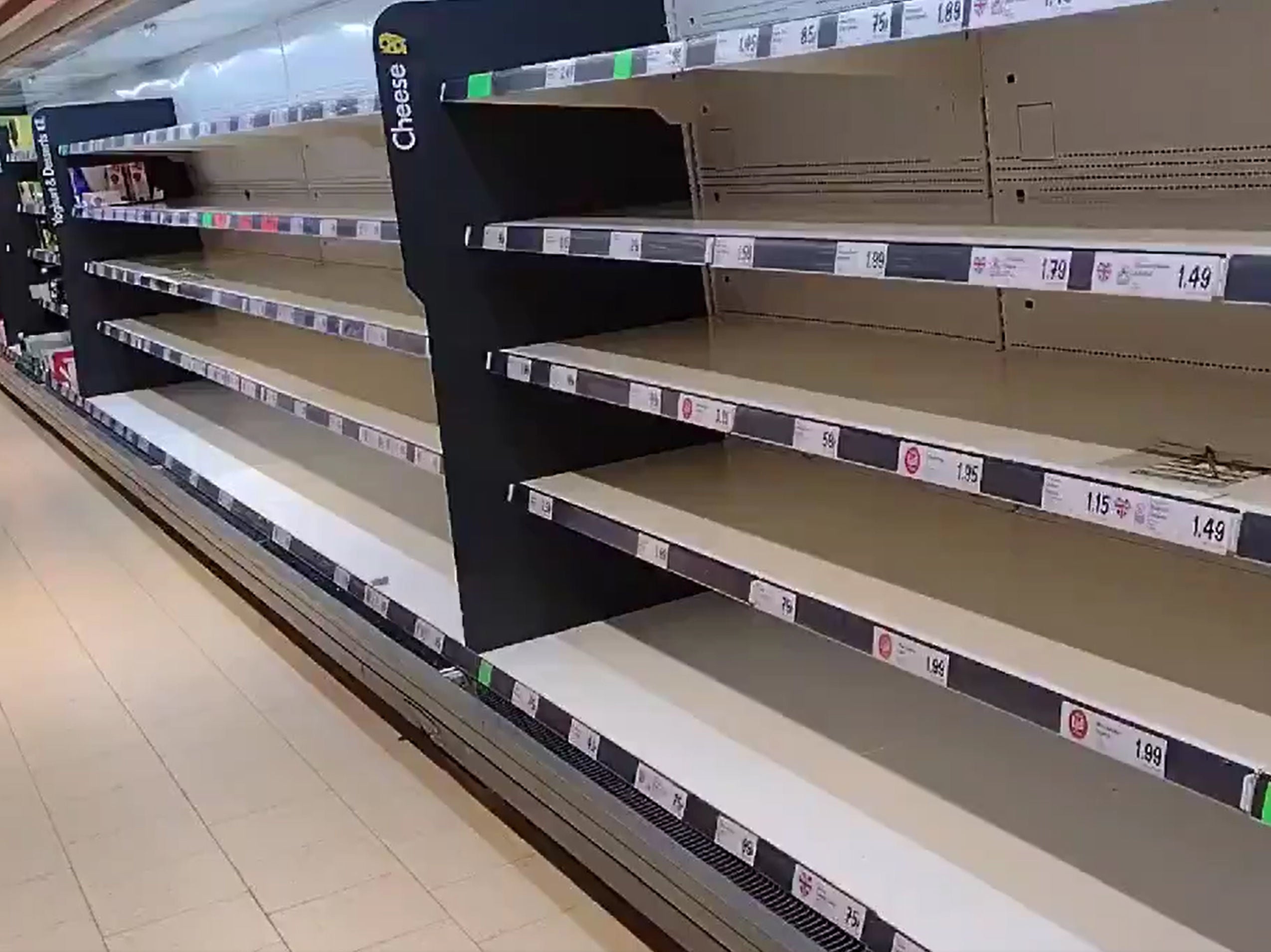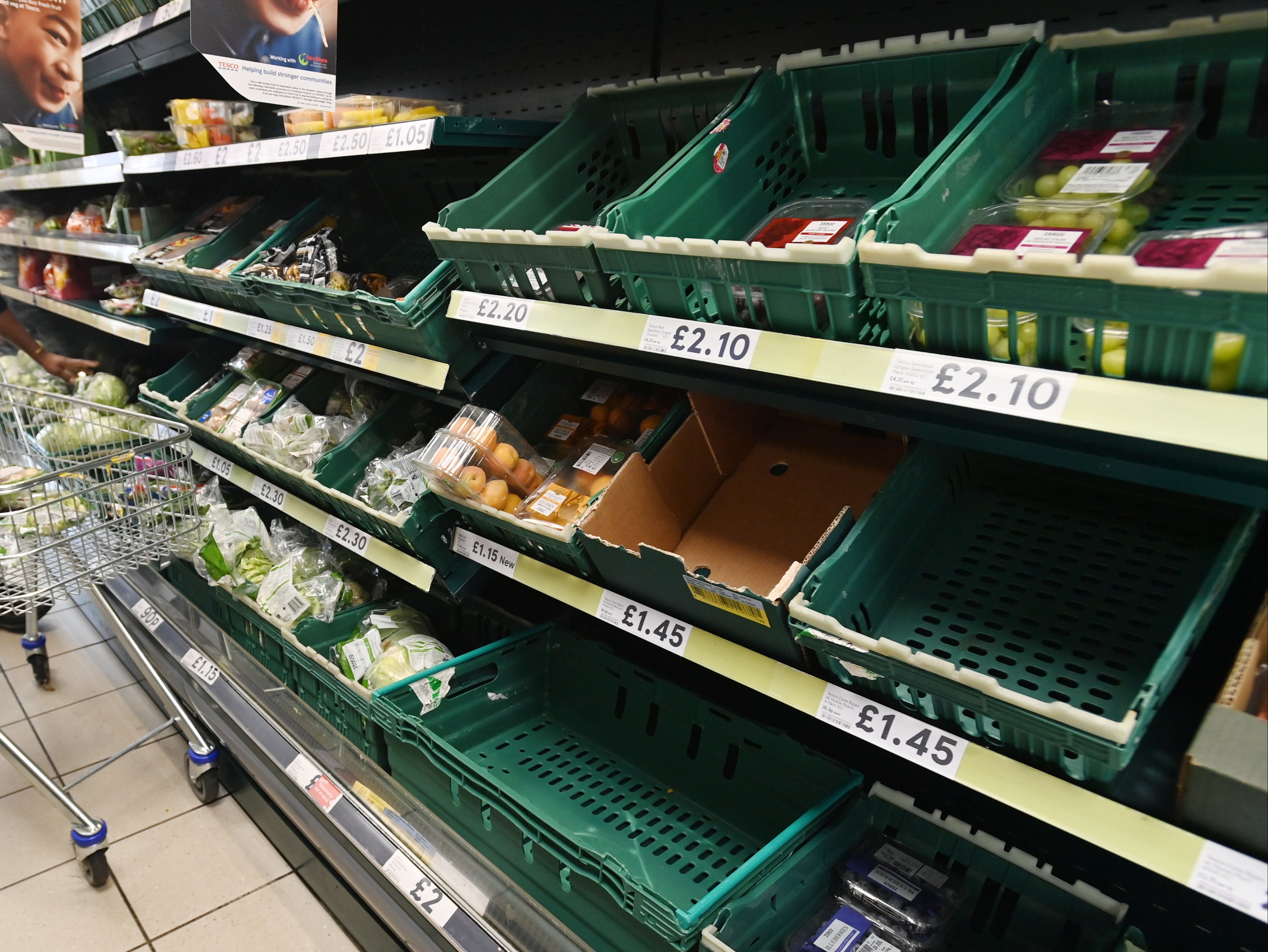Pingdemic chaos: Could the UK run out of food?
Government could hypothetically introduce emergency food rationing if situation reached crisis point, says expert

Your support helps us to tell the story
From reproductive rights to climate change to Big Tech, The Independent is on the ground when the story is developing. Whether it's investigating the financials of Elon Musk's pro-Trump PAC or producing our latest documentary, 'The A Word', which shines a light on the American women fighting for reproductive rights, we know how important it is to parse out the facts from the messaging.
At such a critical moment in US history, we need reporters on the ground. Your donation allows us to keep sending journalists to speak to both sides of the story.
The Independent is trusted by Americans across the entire political spectrum. And unlike many other quality news outlets, we choose not to lock Americans out of our reporting and analysis with paywalls. We believe quality journalism should be available to everyone, paid for by those who can afford it.
Your support makes all the difference.Shoppers are being urged not to stockpile as some supermarkets are already seeing empty shelves caused by the “pingdemic” in an eerie repeat of the early weeks of the pandemic.
Thousands of workers are being forced to self-isolate after being “pinged” by the NHS Covid-19 app, while a shortage of lorry drivers is exacerbating the problem.
The scenes of empty shelves may seem alarming – but how likely is it that the UK would actually run out of food? We asked some experts in the field for their opinion.
Professor Michael Winter OBE, University of Exeter
Michael Winter, a professor of Land Economy and Society at the University of Exeter, said the UK could, in theory, run out of food – but that it was unlikely.
“The simple answer is yes, of course it could because if enough people were not in work because of isolating and in addition if there was disruption to some of the trade for similar reasons and there was further disruption around the transport system and HGV drivers, then, yes, we could face that,” he told The Independent.
“I don’t personally thing that would happen, but theoretically, logically, it could.
“I’m pretty sure that if we got to the situation where there were serious shortages that were considerably disruptive then at that point I’m sure the government would draft in the military, emergency drivers and presumably some sort of emergency rationing system.”
The rural policy specialist said he didn’t believe there would be a “crisis” as issues early on in the pandemic were “dealt with successfully”.
“We have a good logistics system and retailers are incredibly well set up,” he said. “I don’t think personally there’s anything to worry about, I think we have to be a little bit flexible in what we buy, but I’m not a purveyor of panic in this.”
Andy Adcock, former director of food for M&S
Andy Adcock, former director of food for Marks and Spencer, said there might be items supermarkets and shops go short on, but the UK is increasingly producing more of its own food.
“I think we’ve got the best supply chain and supermarkets arguably in the world here,” said the retail expert, who is now a senior adviser at Boston Consulting Group.
“I think the things that go on behind the scenes with suppliers and retailers, it just would not happen.”
Mr Adcock said he believed a lot of the issues with labour shortages were being caused by the NHS Covid app “pinging” workers.
“Once that goes away, it will ease a lot of the problems,” he said.
Professor Michael Bourlakis, Cranfield School of Management
“The food supply is quite robust, it’s quite resilient,” Professor Michael Bourlakis, director of the Centre of Logistics, Procurement and Supply Chain Management at Cranfield School of Management, told The Independent.
“What we’ve seen over the last few years, especially with Covid, the food chain reacted quickly.
“We have got a few extra challenges but I would not say personally it’s very concerning at this moment in time because the supply chains are robust and flexible so they can accommodate.
“We might have some shortages of some specific products but I would not be pessimistic and say we will have no food products.”

Nick Allen, chief executive of the British Meat Processors Association
The chief executive of the British Meat Processors Association (BMPA) said he would be “incredibly disappointed” if we ran out of food after the sector had kept the supply chain running throughout the whole of the pandemic.
“I don’t subscribe to this ‘we are going to run out of food’,” he told The Independent. “I can’t quite conceive how we would end up running out of food in this situation.”
But he added: “That’s not underplaying the fact of how difficult it’s getting at the moment.
“From our perspective, the worst that could happen is if you lost your key abattoir workers, for instance your slaughtermen, because that would mean we couldn’t even take the animals off the farm, because then they grow bigger and that creates animal welfare problems.”
Mr Allen said meat suppliers are faced with two options in this scenario – focus on volume by simplifying products to keep up with demand, or make the type of products that require greater skills and create the most profit in fewer quantities.
BMPA’s members are currently going for volume, he said, to keep shop shelves stocked, which is why there could be some products missing.
Tom Holder, British Retail Consortium
Tom Holder, press officer for the British Retail Consortium, said there was still enough food for everyone even in the excessive stockpiling of March 2020.
“The biggest risk is panic-buying, excess purchasing,” he said. “But people are generally considerate and I think they learnt the lesson last time that as soon as they shop as normal, things get back to normal very quickly.”
He said retail workers are adept at reworking supply chains on demand.
“Unlike before there is actually a supply issue rather than a demand issue in the sense that there are shops that can’t get the stuff on the shelves because they haven’t got enough people around or driver issues,” he said.
“The retailers are incredibly effective at reworking their supply chains on short notice to make sure people get what they need.
“We’re not talking about people going without food, we are just talking about a little bit of less choice.”
Logistics UK trade association
Logistics UK said the UK is “pretty well connected” and there is plenty of stock in the food chain.
“As we saw within the pandemic, yes you stopped getting some fresh food for some time, for example when the border was closed, but then the supply chain corrects itself,” said a spokesperson.
According to the trade association, there is a shortage of about 90,000 HGV drivers, which has been exacerbated by Brexit and a temporary pause on driving tests during Covid.
National Farmers Union
The National Farmers Union (NFU) said the labour shortages affecting supermarkets had also stretched to farming, but that it was “not realistic” to suggest we could run out of food.
“Farmers are continuing to produce food, despite some of the labour supply issues,” a spokesperson added.
“Those issues, combined with the impact of Covid 19, do risk leading to disruption.
“We're continuing to monitor the situation.”



Join our commenting forum
Join thought-provoking conversations, follow other Independent readers and see their replies
Comments